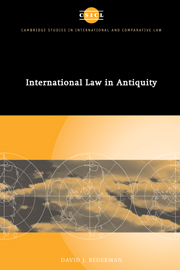Book contents
- Frontmatter
- Contents
- Acknowledgments
- List of abbreviations
- Maps
- 1 A methodological introduction: this study and its limitations
- 2 State relations in ancient civilizations
- 3 Religion and the sources of a law of nations in antiquity
- 4 Making friends: diplomats and foreign visitors in ancient times
- 5 Making faith: treaty practices amongst ancient peoples
- 6 Making war: the commencement and conduct of hostilities in ancient times
- 7 Civilization and community in the ancient mind
- Topical bibliography
- Index
- CAMBRIDGE STUDIES IN INTERNATIONAL AND COMPARATIVE LAW
1 - A methodological introduction: this study and its limitations
Published online by Cambridge University Press: 23 October 2009
- Frontmatter
- Contents
- Acknowledgments
- List of abbreviations
- Maps
- 1 A methodological introduction: this study and its limitations
- 2 State relations in ancient civilizations
- 3 Religion and the sources of a law of nations in antiquity
- 4 Making friends: diplomats and foreign visitors in ancient times
- 5 Making faith: treaty practices amongst ancient peoples
- 6 Making war: the commencement and conduct of hostilities in ancient times
- 7 Civilization and community in the ancient mind
- Topical bibliography
- Index
- CAMBRIDGE STUDIES IN INTERNATIONAL AND COMPARATIVE LAW
Summary
This is a study of the intellectual origins of international law. This volume combines techniques of intellectual history and historiography in order to account for the earliest developments in the sources, processes and doctrines of the law of nations. This combination of methods is not only essential for considering the earliest formation of ideas of international law, but also for beginning an understanding of the manner in which those ideas have been received by modern publicists and the extent to which they have been recognized in the modern practice of States.
My book will thus critically examine what has become an article of faith in our discipline: that international law is a unique product of the modern, rational mind. I argue here that it is not. While this volume charts the intellectual impact of the idea of ancient international law, it purposefully ignores the appreciation of this subject by historians, political scientists and internationalists. My study, moreover, confines itself to the single inquiry of whether the ancient mind could and did conceive of a rule of law for international relations. I certainly do not attempt to argue or suggest here that modern principles or doctrines of international law can be traced to antiquity. Nor do I pronounce judgment on the exact manner in which the ancient tradition of international law was received in early-Modern Europe or after. These inquiries must be left for later research and discussion. I confront here, therefore, an ancient law of nations on its own terms.
- Type
- Chapter
- Information
- International Law in Antiquity , pp. 1 - 15Publisher: Cambridge University PressPrint publication year: 2001

